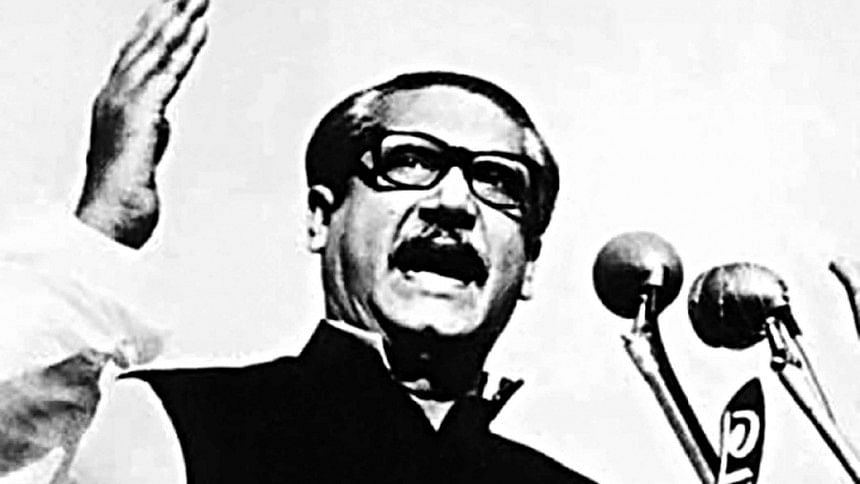The speech that galvanised a nation

The significance of the historic March 7 speech of Bangabandhu lies in the fact that it was extempore—that is, without any prior preparation—but which in effect prepared an entire population for an epic struggle leading to its emancipation from the shackles of a brutal, obstinate and autocratic establishment. The deprivation, desire, intent, anger and expectations of a rejuvenated population found an eloquent and poignant expression in the soul-stirring captivating speech of 19 minutes at the historic Race Course Maidan.
As a public speaker, Bangabandhu never failed to appropriately capture the emotions and expectations of his audience and on March 7, 1971, he was at his eloquent best— stopping short of an outright declaration of independence, he said what needed to be said at that historic juncture. We have to bear in mind that he was a constitutional politician and had to be aware of the limiting factors. Although by March 7 many began to realise that independence was the only acceptable goal, the burden of responsibility rested on Bangabandhu. The full implications of an outright declaration of independence on March 7 had to be carefully weighed.
The cynics who point to the absence of a unilateral declaration of independence on March 7 conveniently forget that such a declaration would have meant the direct engagement of the full force of the Pakistani military. Quite naturally, such a move would have given the army a pretext for applying force to impose their will. In such an eventuality, the premonition that an unarmed population could not have absorbed the shock of a massive onslaught cannot escape a rational strategist. There was also the issue of the holding capacity of Bengalis against an organised military operation; and given the different global and regional interests of the world powers at the given time, there were credible doubts on whether recognition and acceptance of an independent Bangladesh could become a reality.
For Bangladeshis, it is indeed a matter of honour to know that on October 30, 2017, UNESCO added this speech to the Memory of the World Register as a documentary heritage. On March 7, Bangabandhu stood up at the Race Course Maidan and delivered a thunderous speech that laid the foundations of Bangladesh. His opening utterances effectively highlighted recent happenings and appealed to the audience when he said; "My dear brothers, I have come before you today with a heavy heart. All of you know and understand how hard we have tried. But it is a matter of sorrow that the streets of Dhaka, Chattogram, Khulna, Rangpur and Rajshahi have today become coloured with the blood of my brothers. Today, the people of Bengal want freedom, they want to live, the people of Bengal want their rights".
According to one observer, "if the contents of the speech are analysed, it is seen that it was basically a message about the emergence of a new State on the global map and a notification cum narrative on the winding up of the eastern region of the then Pakistani State as a natural progression."
This speech was a psychological and morale booster during the nine months of the liberation struggle and Bengalis, young or old, were energised with the patriotic zeal to achieve the desired emancipation. One could say that this memorable address was a de facto declaration of Bangladesh's independence.
If one sees through the lens of a mass communication expert, one would find that "it was a dialogue between the people of Bangladesh and their undisputed leader on the eve of Bangladesh's birth". In effect, the speech became a historic document of our liberty. One could not but be moved by the conversationalist style of the speech in which Bangabandhu raised five questions at different stages, and those were, "What wrong have we done? What did we get? What Round Table Conference? With whom shall we sit? Shall we sit with those who have taken the blood of my people?"
When it came to the issue of giving orders, directives or warnings, the expressions in the speech were short and direct like "the employees will fetch their salaries on the 28th. Turn all your homes into fortresses. I say to the government employees: what I say has to be obeyed. As long as this country does not become free, no revenues/taxes will be paid. Nobody will pay."
The speech placed on record undeniable facts of history and roused the patriotic zeal of the people when Bangabandhu, in an emotion-charged voice, said: "The arms that were purchased with our money to protect the country from attacks by external enemies are now being used against the poor, sad and suffering people of my country. Bullets are being fired into their chests. We are the majority in Pakistan, but whenever we tried to assert our rights, they pounced upon us."
Dale Carnegie has famously said that "The best argument is one, which seems merely an explanation." Viewed in this light, "A lucid and detailed explanation about the events unfolding at the time made this speech withstand the test of logic for all times to come."
The last sentence of Bangabandhu's March 7 speech—"The struggle this time is for emancipation! The struggle this time is for independence!"—was effectively a declaration of independence expressed with a firm resolve, which had, in fact, defined the speech. The way he concluded the speech tallied exactly with textbook communication theory. It is said, don't drag out your conclusion. We often use words like "in conclusion" or "we must say one thing" while concluding a speech. But Bangabandhu directly entered the "speech definition" in his historic address—through an appropriate application of communication theory, which was quite unthinkable 50 years ago.
Muhammad Nurul Huda is a former IGP of Bangladesh.

 For all latest news, follow The Daily Star's Google News channel.
For all latest news, follow The Daily Star's Google News channel. 



Comments